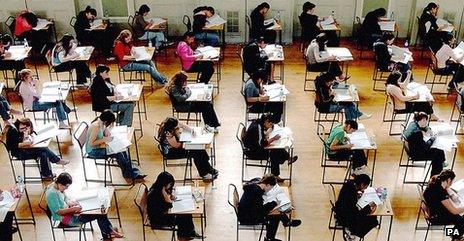The Ebacc: What's in a name?
- Published

It has been described as the biggest overhaul of the examinations system in a generation, but ignoring the pros and cons of the new English Baccalaureate Certificate, what's behind the name?
It could be the Ebacc for short, or even English Bac. One might try E Bac, or E-Bac if hyphenation is your thing.
Or maybe kids will prefer EBCs, faintly redolent of the now-departed EMA cash payments to students.
Those on Twitter have been exploring the possibilities since the Education Secretary Michael Gove announced the changes on Monday.
The EBacc - "has a faint air of Yorkshire about it," says @DavidMills73 on Twitter, while for @poundlandqueen, the new qualification sounds like "some sort of a class A drug, not an exam."
"Sounds like a hospital-acquired infection," says @julianvaccari, while @poptartsuk asks: "How do you pronounce EBacc, is it like Ewok? If so I like them a bit more." In the same vein, @Jamaltyler tweets, "Glad I don't have to do this Ebacc thing, reminds me of chewbacca!"
Finally, former minister @Andrew_Adonis, external tweets: "I love Jacob Rees-Mogg's quip: 'The problem with EBACC is it sounds like a rather disappointing run of O-level results."
The revamped English Baccalaureate, external will replace GCSEs in 2017.
But the English Baccalaureate already exists in one sense. Since 2011, pupils who achieve a GCSE grade C or better in English, maths, a language, history or geography and two sciences get one. EBacc already has a head start as the abbreviation of choice.
Luckily it has the extra "c", as the top result from a Google search of EBac welcomes you to the Ebac Group, a manufacturer of bottled water coolers and domestic dehumidifiers.
"Baccalaureate has an interesting etymology, which is not fully understood," says David Crystal, Spell It Out: The Singular Story of English Spelling.
One theory is that it is a reference to the laurel wreaths given to victors, with the "bacca" being a variation of the Latin word for berry.
But the Online Etymology Dictionary, external suggests it may simply be a "relatinisation" of the word bachelor, used in the academic sense. The OED traces "bachelor" from the Medieval Latin "baccalaris" via the Old French "bacheler".
"All new abbreviations have echoes of things that have gone before," says Crystal.
"EBacc has two very strong associations in terms of abbreviations: E, as in [the bacteria] E. coli, and Bacc, which is already an abbreviation of bacillus [a form of bacteria]. The association is, therefore, inevitable."
"Often these 'deep memory' associations crop up with abbreviations. But, I always say familiarisation breeds content. I reckon in a year's time, all those associations will have gone. I go into schools a lot and people often refer to the 'Bacc' [the International Baccalaureate Certificate preferred by some schools to A-Levels]."
But Dr Tom Woodin, senior lecturer in education at the Institute of Education, University of London, does not think it is a "particularly good name".
"Given that education policies are changing so rapidly, with so many new words and acronyms flying around, people start to switch off. It will need to be explained many times."

Studying the three Rs
There is a wealth of other acronyms and abbreviations in the recent history of education. In the UK, there's Sats, although across the Atlantic they're usually pronounced SATs.
And remember the 3Rs - which aren't really Rs at all - Reading, wRiting and aRithmetic?
"Education is replete with abbreviations and acronyms; they seem to reproduce like viruses. Teachers and others involved with the education system(s) in the UK are apparently so busy that they don't have time to speak in full sentences and instead devise an arcane language littered with a kind of shorthand," according to the Cambridge Handbook of Educational Abbreviations and Terms, external by Richard Hickman.
Holders of GCSEs may not remember that there used to be CSEs. And who outside the education establishment uses the term GCE any more?
Benjamin Slade, principal of The Manor school in Cambridge, says the term baccalaureate does strike a rather grand note
"Perhaps it's to give it the same kudos as the International Baccalaureate, which is offered in high-performing schools," he says. "Maybe it's another attempt to get the English education system up on the world stage."
If David Crystal's theory is correct - that the term won't seem odd for long - the class of 2017 may not have to suffer jokes the likes of this by @BenKellyMusic:
"She only went in with a bad flu and now she has that #EBacc."